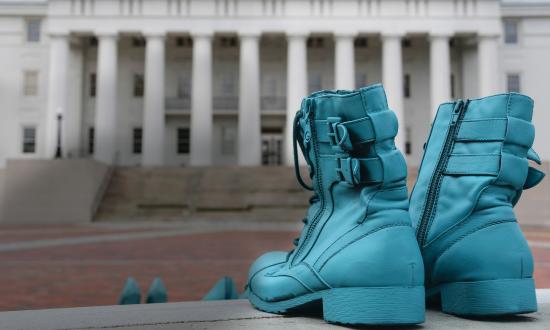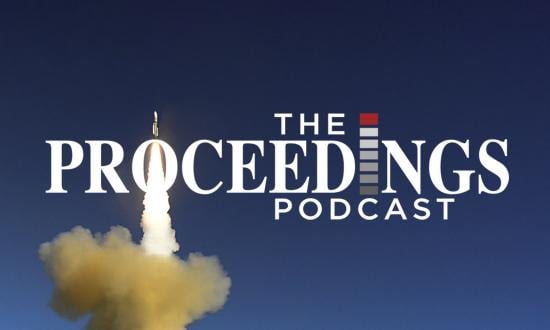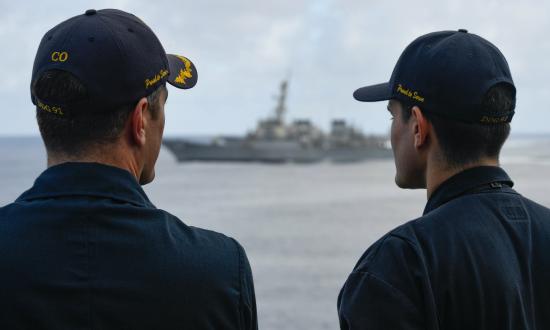Since the plain of Thermopylae, character is the critical starting point in developing soldierly readiness and will be increasingly important in current competition and future conflicts. Character is, and will be, such a critical element of combat success that all leaders must deliberately approach character development as integral to combat readiness. This is the heart of the spiritual fitness effort in the Marine Corps—preparing the warrior for today’s competition and any future conflict.
The Marine Corps has a history of considering the role of the spiritual in conflict going back to General John Lejeune.
There is no substitute for the spiritual in war. Miracles must be wrought if victories are to be won, and to work miracles men’s hearts must be afire with self-sacrificing love for each other, for their units, for their division, and for their country. If each man knows that all the officers and men in his division are animated with the same fiery zeal as he himself feels, unquenchable courage and unconquerable determination crush out fear and death becomes preferable to defeat and dishonor.1
Character that produces the courage to press the fight begins with paying attention to the spiritual, thus making spiritual fitness a critical aspect of readiness.
Strengthening alliances and attracting new partners is the second goal of the National Defense Strategy. A materialistic approach to meeting this goal—an approach that builds alliances solely on the value of the arms or material support the United States provides to allies—is an unstable foundation that may not survive a better deal on equipment or greater material resources. Stable alliances are built on trust and an admiration of the high character of one’s ally. Herein, the far-sightedness of General Charles C. Krulak’s “Strategic Corporal: Leadership in the Three Block War” is still current: It will be the individual character, the trustworthiness of our Marines and sailors, that will be the long-term foundation of U.S. alliances and make the United States the partner of choice.
In his Commandant’s Planning Guidance, General David H. Berger envisions decentralized command and control at the tactical level. Small-unit leaders are entrusted with making the right decisions with split-second timing. This environment must drive senior leaders to build the character of subordinates so they can make difficult, ethical decisions quickly and in the absence of consultation with higher echelons. Here again, Krulak’s Strategic Corporal will be the one making decisions that gain or lose allies or the support of the American public.
It is important to note that leaders cannot assume the character of those led. Americans arrive to the “yellow footprints” carrying a variety of personal experiences, and their own cultures, traumas, and worldviews. The institutions of American society that traditionally took on the role of character development—religious institutions, youth organizations, organized sports, etc.—are no longer as influential as they once were. Therefore, character development has moved from a societal effort to an individual effort, almost a private endeavor not tackled as part of a larger group but in the confines of one’s own heart and soul. Yet, a military institution that aspires to engage in conflict in a just manner requires a baseline of character among its warriors, just as it requires a baseline of physical fitness. These baselines are set during accession training—Marine Corps Recruit Depot, Officer Candidate School, The Basic School, etc.—and while they are transformative, this brief time of training is not comprehensive nor sufficient for the never-ending task of character development.
Since character development is an infinite task, it demands intentionality from Marine Corps leaders; but this is not a new idea. Intentionality in character development is foundational to the U.S. experiment in democracy. In crafting the Declaration of Independence, the founders drew on the philosophy of English thinker John Locke. Locke mused that individuals had a right to life, liberty, and property.2 Ultimately though, the founders opted to modify the phrase to the familiar “life, liberty, and the pursuit of happiness.” The change is telling; the founders did not equate happiness with acquiring property, nor did they intend happiness in an amorphous, feelings-based way. The founders envisioned happiness as described with the Greek concept eudaimonia—the deep happiness that arises from living a life of character consistent with one’s core beliefs. Put more simply, eudaimonia is happiness arising from doing the right thing for the right reasons.
The good news is that Americans who choose to become Marines are already in a prime window to develop spiritual strength and become people of character. Evidence-based research in developmental psychology indicates that young adults between the ages of 15 and 25 are in the ideal window to develop deep character and a life of meaning.3 Further, this development can be positively affected when young people are given the room and supported as they develop their own answers to the larger questions of life. In other words, we cannot tell young Marines what to think, but it is within our power to tell them what to think about. The ancient philosophers asked questions such as “What is good?” “What is true?” “What is beautiful?” “What is just?” to drive thinking to a deeper level. When Marines grapple with hard questions, they develop spiritual strength and resilience.
This grappling with hard questions requires mentorship and leadership, not PowerPoint presentations or General Military Trainings. The Commandant has elevated the importance of spiritual fitness as equal to physical fitness. Marine Corps leaders at every level are supposed to prioritize it, yet the greatest opportunity to facilitate spiritual fitness is with the midgrade professional. The staff sergeants and the majors are the leaders both vested in the long-term success of the Marine Corps and with the experience and maturity to both foster the work of spiritual fitness and drive it day after day. Giving these leaders the reins and freedom to lead in spiritual fitness is the key to success.
To be clear, spiritual fitness is an ethos, a way of life, not a program. It is an ethos that values reflection on (1) one’s personal beliefs, (2) the values that grow out of those beliefs, and (3) the decisions that are the outcome of one’s values. Chaplains and religious program specialists (RPs) can provide the moral, ethical, and spiritual “gym,” or grappling space, where Marines can become spiritually stronger. Stretching the analogy a bit further, they function as coaches, helping Marines grapple with the hard questions of life that lead to character development.
Because spiritual fitness is an ethos, not a program, the benefit comes in the grappling, not in a predefined outcome. Wrestling with hard questions, such as the meaning of honor, the types of courage, or the consequences of commitment, is the terminal objective. Spiritual fitness is like other types of fitness: there is no point when a Marine is done with spiritual fitness any more than there is a point when a Marine is done with physical fitness. Spiritual fitness is a way of life that requires constant exercise. Commanders and leaders at every level have the same responsibility for fostering it as they do for physical fitness. Leaders cannot do the hard work of spiritual fitness for the individual Marine or sailor, but they can model how a warrior attends to spiritual fitness, create an environment where the warrior is encouraged to grapple with tough questions, and provide the “gym,” the “trainers,” and the “exercises” that will facilitate true character development.
Warriors who grapple with their own beliefs and assumptions are most likely to become warriors of character. Marines of character have the vision to recognize moral hazards, the wisdom to discern the honorable path, and the courage to take it. Spiritually fit Marines have the capacity to do these things in the blink of an eye and are trusted by their commanders to do so. That sort of Marine is the partner of choice in a chaotic and dangerous world.
1. GEN J. A. Lejeune, USMC, The Reminiscences of a Marine (Philadelphia: Dorrance and Company, 1930), 40.
2. John Locke, “Second Treatise of Government,” 2:6.
3. Lisa Miller, The Spiritual Child: The New Science on Parenting for Health and Lifelong Thriving (New York: Picador, 2015) 207–68.






